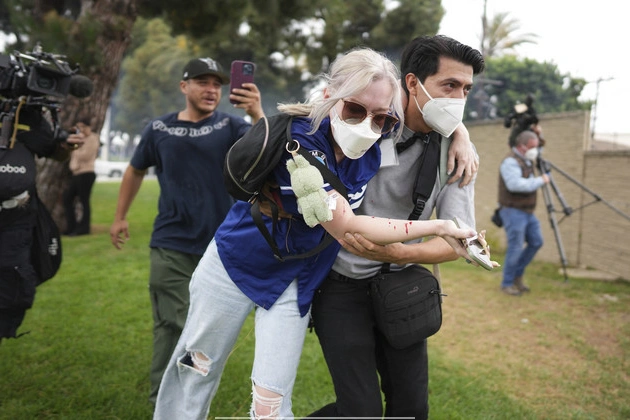
California Governor Gavin Newsom strongly criticized President Trump’s plan to deploy thousands of National Guard troops to quell pro-immigrant demonstrators in the Los Angeles area, labeling the action as ‘purposefully inflammatory.’
The Democrat’s remarks came in response to Trump’s border czar Tom Homan’s announcement of the administration’s intention to send National Guard troops to the area.
Escalating Tensions
In a statement, Newsom expressed concern over Trump’s move to take control of the California National Guard and deploy 2,000 soldiers without the governor’s approval, potentially escalating tensions after confrontations between protestors and immigration agents during local business raids.
Trump’s social media post targeted Newsom and Los Angeles Mayor Karen Bass, suggesting federal intervention was necessary due to their alleged inability to handle the situation.
Clashes and Arrests
The standoff in Paramount, a small city in southeast Los Angeles County, marked the second day of clashes over high-profile immigration raids, resulting in the arrest of 44 individuals for immigration violations.
Among those arrested was SEIU California’s president, David Huerta, whose detainment injuries led to brief hospitalization and drew criticism from California Democratic officials, including Governor Newsom.
Confrontations and Responses
In the midst of federal agents and protestors facing off in riot gear in Paramount, tensions rose as tear gas and flash-bang grenades were used to disperse the crowds.
Homan emphasized the right to protest while warning against impeding ICE operations, indicating imminent National Guard mobilization to enforce the law.
Newsom rebuffed the need for federal intervention, asserting that local authorities had sufficient law enforcement support and coordination, deeming the National Guard deployment unnecessary and potentially damaging public trust.
As the situation unfolds, the clash of federal and state responses underscores the ongoing debate over immigration enforcement tactics and the role of military intervention in domestic affairs.











